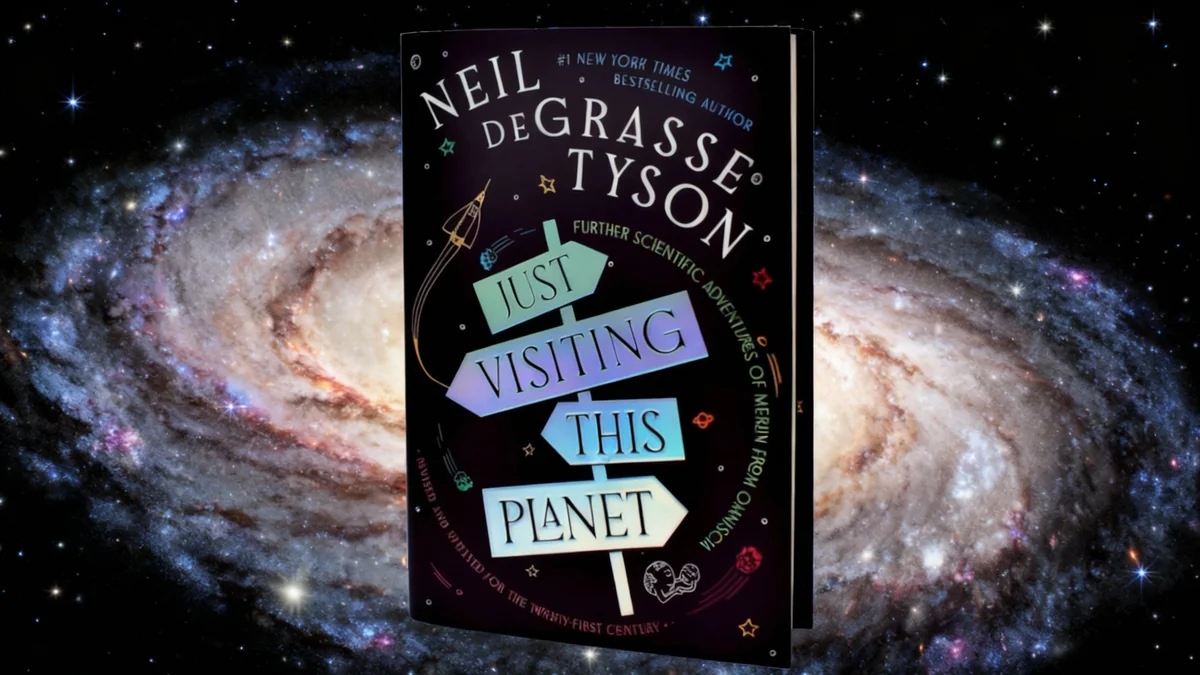Astrophysicist Neil deGrasse Tyson has issued a stark warning about the long-term consequences of cutting science funding, stating that such decisions will “ultimately bite you in the ass.” The comments coincide with the announcement of his upcoming book, a newly revised collection of cosmic questions and answers designed to foster public curiosity in science.
The new volume, titled “Just Visiting This Planet: Further Scientific Adventures of Merlin From Omniscia,” is set for release on October 21, 2025. It continues the work of his first book, using a fictional alien to make complex scientific concepts accessible and engaging for a general audience.
Key Takeaways
- Neil deGrasse Tyson's new book, “Just Visiting This Planet,” will be released on October 21, 2025.
- The book is a revised and updated version of his 1998 work, featuring 200 cosmic questions and answers.
- Tyson expressed grave concerns over current trends of reduced funding for scientific research.
- He argues that foundational science is essential for future technological and industrial innovation, even without immediate financial returns.
- He criticizes politicians who dismiss research projects they deem frivolous without understanding their potential long-term value.
A New Collection of Cosmic Questions
Fans of Tyson’s approachable style of science communication can look forward to another installment in his “Merlin” series. The upcoming 350-page book revives a character from Tyson's early career: Merlin of Omniscia, a wise and witty alien sorcerer from the Andromeda galaxy who answers questions from Earthlings.
This new volume is a refreshed version of a book originally published in 1998. For this edition, Tyson curated a new set of 200 questions from a pool of over a thousand submissions. He explained that he removed questions with simple answers now easily found online, such as the temperature of the sun.
Instead, he focused on more imaginative and thought-provoking queries. “Someone asks, ‘What happens if aliens came and blew up the moon?’ That's kind of fun,” Tyson noted, highlighting the book's focus on “If, Then” scenarios that encourage deeper thinking. The book will also feature illustrations by his brother.
The Merlin Persona
The character of Merlin was first introduced in a Q&A column for StarDate Magazine from The McDonald Observatory. Tyson explained that this early work was a “proving ground” for his public science communication style. He imbued Merlin with a distinct personality to make the learning process more enjoyable and memorable, a stark contrast to the often soul-less answers generated by AI today.
A Warning on the Retreat from Science
Beyond the excitement for his new book, Tyson delivered a serious message about the current state of scientific investment. He voiced deep concern over widespread layoffs and budget cuts affecting the scientific community, arguing that abandoning the frontiers of research comes with severe consequences.
“If the democracy you want is one that is cutting science programs, that will ultimately bite you in the ass,” Tyson stated directly.
He emphasized that the innovations many take for granted are built upon a foundation of basic scientific research. “American industry relies on the foundational science that's behind it, underneath it, and is supporting it,” he said. “And you don't see that because it's done in labs in universities and it's done by people who don't necessarily have YouTube channels.”
Book Details
- Title: Just Visiting This Planet: Further Scientific Adventures of Merlin From Omniscia
- Author: Neil deGrasse Tyson
- Publisher: Blackstone Publishing
- Release Date: October 21, 2025
- Length: 350 pages
The Hidden Value of Foundational Research
Tyson elaborated on why government funding is critical for this type of exploration. He explained that foundational research is often too far removed from a marketable product to attract corporate investment, as there is no immediate “return on the annual report.”
It is the role of government, he argued, to fund this exploration into the unknown. Once a new discovery is published and understood, “then you have clever engineers coming afterwards saying that they can turn that into a product or make that commercial. That happens way down the line.”
This long-term process, he believes, is poorly understood by policymakers who may pass judgment on research without grasping its potential importance.
The Danger of Shortsighted Decisions
Tyson specifically criticized government officials who review research paper titles and make funding decisions based on whether a topic sounds “frivolous” or irrelevant to their immediate concerns.
“The fact that we have government officials poring over research paper titles and lording their decision on whether it's frivolous or not because they can't imagine how it's relevant, that will have consequences,” he warned.
He pointed to other nations, particularly China, that have “re-doubled the role of science in their lives.” He predicts that as the U.S. recedes on the scientific frontier, it will eventually realize the “folly of those decisions.” For Tyson, books like his are part of a broader effort to get people excited about science, an investment he believes “only pays dividends in the future.”





